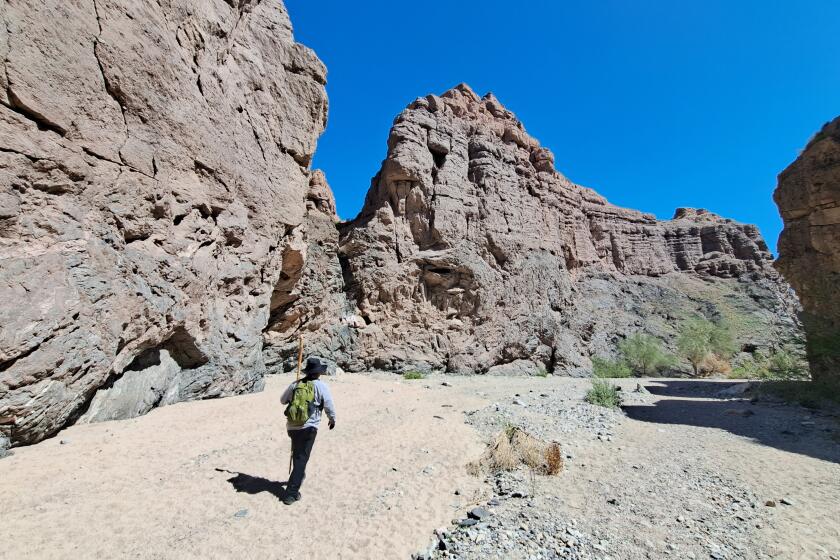California Senate vote keeps bullet train alive
SACRAMENTO — The state Senate authorized initial funding for California’s high-speed rail project, handing a victory to Gov. Jerry Brown and the Obama administration, which have been pushing hard for the first-in-the-nation bullet train.
It is unclear when construction on the largest infrastructure project in the country can begin; the state still needs a series of regulatory approvals to start the first 130 miles of track in the Central Valley. The plan also faces lawsuits by agriculture interests and potential opposition by major freight railroads.
But proponents rejoiced at Friday’s narrow 21-16 vote, which allocates roughly $8 billion for the first segment of track and related transportation projects. Barring insurmountable obstacles, Californians eventually will be able to ride a bullet train — traveling as fast as 220 mph — between Los Angeles and San Francisco rather than fly or drive on aging highways.
“The Legislature took bold action today that gets Californians back to work and puts California out in front once again,” Brown said in a statement. The governor has been promoting the project since taking office in 2011 and is expected to sign the funding bill.
Senate President Pro Tem Darrell Steinberg (D-Sacramento), who was under intense pressure to round up votes in support of the plan, called Friday “a turning point in California, a time when we decided to say yes to hope, yes to progress, yes to the future.”
The federal government, which is providing most of the money for the project, had threatened to rescind funding if the Legislature did not authorize funds this month.
On Friday, U.S. Transportation Secretary Ray LaHood, who had made repeated trips and telephone calls to California to push for the project, called the vote a “big win” for the state.
“No economy can grow faster than its transportation network allows,” LaHood said in a statement. “With highways between California cities congested and airspace at a premium, Californians desperately need an alternative.”
Republicans assailed the project as a misuse of taxpayer money. Not one GOP lawmaker voted for the bill in the Senate or in the Assembly, which passed the measure Thursday before adjourning until August. Both houses are now in recess.
The bill included $5.9 billion — about $3.2 billion in federal money already committed and $2.6 billion in state bond funds — for the section of track from Madera to Bakersfield.
There was also nearly
$2 billion for other rail projects, such as electrification of Cal Train tracks in the Bay Area and improvements for Metrolink in Los Angeles County.
The vote hinged not on whether high-speed rail is a good idea — Democrats have overwhelmingly favored the concept — but on whether Washington and the Brown administration had the right plan.
Sen. Joe Simitian of Palo Alto was one of four Democrats who voted no, even though he supports the long-term vision for a bullet train.
“This the wrong plan,” he said, “in the wrong place at the wrong time.”
Democratic senators from around San Francisco and Los Angeles had criticized the plan to start construction in the rural Central Valley rather than in more congested metropolitan areas.
They had also raised questions about the future of the project, because Republicans in Congress have threatened to cut off any future appropriations that would help complete the system.
When voters approved borrowing of $9.9 billion for the project in 2008, the economy was just heading into a recession that has left the state’s finances tattered and taxpayers worried about the cost.
Since then, the project has faced delays and rising costs. The price tag was $33 billion, with a completion date of 2020, when voters said OK.
The estimated cost shot as high as $117 billion before settling at $68 billion, and the completion date was pushed to 2028.
In addition, the proposed route through the Central Valley ignited a legal war. Farm bureaus, irrigation districts and rural counties have filed suit to halt the project.
Meanwhile, public opinion has moved against the project.
A USC Dornsife/Los Angeles Times poll in May showed that 59% of voters would reject the plan if it were back on the ballot.
A Field Poll released this week suggested that billions of dollars in spending on high-speed rail could dampen voters’ enthusiasm for Brown’s tax increases on the November ballot.
The poll found that 21% of voters who back Brown’s measure would be less likely to support it if the Legislature appropriated bullet-train money.
In the survey, 17% of voters said approval of the rail funds would make them more likely to support the governor’s call for higher taxes.
More to Read
Get the L.A. Times Politics newsletter
Deeply reported insights into legislation, politics and policy from Sacramento, Washington and beyond. In your inbox three times per week.
You may occasionally receive promotional content from the Los Angeles Times.








